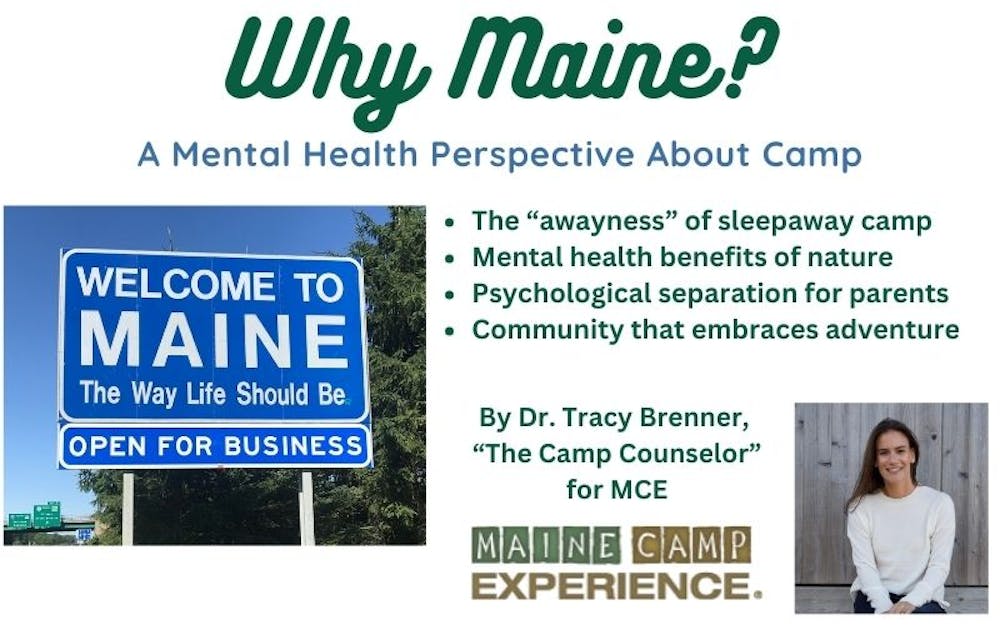
Why Maine? A Mental Health Perspective About Camp
December 12, 2023
Guest blog post by Dr. Tracy Brenner, “The Camp Counselor,” who is a Maine camp alumna camper/counselor and a Maine camp parent.
The blue sign you see as you cross the border on I-95 welcomes you with the words “Maine — the way life should be.” While this motto may seem aspirational, there’s a lot about the Pine Tree state that makes it an idyllic setting for sleepaway camps. Maine epitomizes nature. It has rugged mountains for hiking, crystal clear lakes for canoeing, kayaking and swimming and the longest coastline in the Northeast for day trips to beaches. With over 90% of the state covered with forest, camps have large acreage so campers fully maximize the enjoyment of the outdoors. The natural beauty of Maine is not just enjoyable for our senses, it is good for our mental health as well. Being in nature has been linked to all kinds of benefits including improved attention, lower stress, better moods, more happiness, greater empathy and more cooperation.
Most importantly, Maine is away. If you have read my previous blogs, I believe that it is the “awayness” of sleepaway camp that makes it uniquely well-suited to promote resilience, independence and self confidence in children. However, I sometimes hear parents say, “we aren’t looking at Maine camps, it’s too far.” Distance, of course, is all relative, and in my opinion, shouldn’t be a deterrent. In some ways, distance might even be a benefit to our kids and ourselves.
Distance helps protect the “awayness” of sleep_away_ camp. By accepting a greater physical separation, Maine camp parents may, in turn, enjoy more psychological separation. Since they can’t just “pop over” to camp, they may be better able to psychologically separate as well. It’s that psychological separation (or letting go) that lets kids reap the social emotional benefits of the camp bubble: independence, resilience and self confidence. These skills are much harder to develop when parents swoop in to rescue their children.
If a parent makes distance from home a deciding factor when choosing a camp, then the decision is likely fear driven and may in turn limit parents in finding the best fit for their child. When worries direct decision making, that is a signal to pause and reassess. Fear should not be in charge of our choices. A parent with this mindset might think, “I’m only looking at camps within a two hour driving distance. What if I am needed?” My response, “Yes, it would be scary if there were a true emergency at camp. The reality is, true emergencies are rare, and when they occur, decisions need to be made in minutes, not hours.” Instead of focusing on travel time in choosing a camp, I encourage you to focus on trust. Ask yourselves, which camp directors, regardless of where the camp is located, do I trust to make decisions for the health and wellbeing of my child? When we trust we can really let go, when we let go we are able to let campers get the most social and emotional growth from their camp experience.
Finally, a bit more distance might attract a more adventurous clientele – families who aren’t afraid of extra miles, but embrace it. They appreciate that camp is all about stepping outside of your comfort zone and having new experiences. It’s no wonder that Maine campers attract children from all over the country and overseas. Parents, consider the merits of pushing yourself to look beyond your perceived geographical comfort zone and expand the map to find the best fit.
For questions or consultation, connect with Dr. Tracy on instagram @drtracybrenner, on her website at www.drtracybrenner.com or by email at drtracybrenner@gmail.com